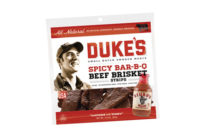Healthy Perceptions
By Dan Malovany
Aggressive promotion, creative new products, innovative menu alternatives and the nurturing of the image of tortillas as better-for-you products are driving sales both in the United States and abroad. The tortilla industry is in a healthy position, in more ways than one.
To survive in today’s competitive market, businesses need to be quick to identify emerging trends. To thrive in the snack and baking industries, companies must respond almost immediately to everything from fad diets to changing consumer eating habits.
That’s exactly what the tortilla industry has done over the years to build a category that now has an estimated $6 billion in annual sales. From a nutrition standpoint, tortilla manufacturers cut the fat, but not the taste, during the 1990s as Americans reduced fat consumption in a futile effort, some may say, to shrink their ever-expanding bodies. Then again, during the low-carb craze a few years ago, tortilla producers developed products that contained reduced levels of carbohydrates that passed the taste test, as far as consumers were concerned. Of course, it didn’t hurt that tortillas are naturally lower in carbs than many other baked goods.
Now, companies like Mi Rancho Tortillas are jumping on the whole grain train and toying with organic.
“We’re going toward healthier products, such as multigrain, higher-in-fiber, eliminating trans fats and going organic,” says Ken Sanchez, vice president of sales and marketing for the San Leandro, Calif.-based company. “Those are the areas where we’re seeing a lot of activity.”
Specifically, Mi Rancho Tortillas is rolling out its Healthy Mex line, which basically is composed of all of the better-for-you products that it’s developed over the years, along with a few new ones, including a battery of varieties containing higher amounts of fiber, whole wheat and whole grains.
“We’ve had a low-carb tortilla for a while and a low-fat one,” Sanchez explains. “We’re taking these products along with some other things on the organic side and putting them all under the Healthy Mex banner.”
Likewise, he adds, tortillas are versatile products that can be used in everything from Mexican food, mainstream wraps and thin-crust pizza to poppable appetizers and grab-and-go snacks both in the retail and foodservice channels. In many cases, tortilla operators use meal suggestions on the back of their packages to spur the imagination of supermarket shoppers and chefs and to demonstrate new menu possibilities to potential foodservice customers.
“Tortillas are such great carriers, but they are also smaller than most breads and a lot healthier than some breads,” Sanchez notes.
Those may be fighting words in the snack and baking industry, but many companies are coming to the conclusion: “If you can’t beat them, join them.”
Pita and other flatbread producers, for instance, are broadening their product portfolios to include tortillas, as well as sturdier versions that are a hybrid between pitas and tortillas. Brooklyn, N.Y.-based Damascus Bakeries features a study flatbread called Roll-Up, which is rectangular, has the texture of a hybrid pita and tortilla, is high in fiber and low fat, and contains a good source of Omega-3 fatty acids.
Not to be outdone, Tumaro’s Gourmet Tortillas, based in Los Angeles, has branched out beyond tortillas with its version of Soy-full Heart Flatbreads. The 8-in. kosher flatbreads come in Soy & Flax, 8 Grain ‘N Soy and Apple ‘N Cinnamon, and are high in fiber, protein and Omega-3 fatty acids.
Stealing a page from the bread, bun and roll bakers, tortilla companies are custom designing products in a variety of different shapes and flavors for foodservice establishments ranging from quick-service, sub shops and mom-and-pop diners to casual-dining operations, catering businesses and even fine-dining restaurants. It all depends on who their target audience is, Sanchez says.
“Foodservice restaurants can create things much easier than retail,” he explains. “The consumer on the retail side is much more focused on health. They’re thinking about no trans fats, about organic, about fiber and about lowering their carbs. Those trends will eventually impact foodservice, though.”
An International Discovery
Throughout Europe, primarily in Scandinavia and northern countries, tortilla sales continue to catch on in popularity. In the United Kingdom, for instance, supermarket data shows that tortilla sales jumped 15.5% for the year ending May 2006, according to Brian Ridgeway, managing director of Discovery Foods, based in Daventry, England.
“There is strong growth in the ‘fresh bakery’ sector — typically products with a shelf life of seven to 30 days — driven to date by supermarket own label brands,” Ridgeway says.
Burgeoning sales of private label brands, however, have had a deflationary impact, as tortilla wraps — which not long ago were considered a specialty item — are perceived as more of a commodity by consumers. However, Ridgeway adds, don’t discount the power of branded items such as those from Discovery Foods, the top-selling tortilla producer in the UK. Gruma Corp.-owned Mission Foods, the leading producer of tortillas in the United States, is another player in that market.
To spark volume, Discovery will partner with its retail customers and offer roll-back and buy-one-get-one-free promotions. To boost Discovery’s premium positioning, the company also is rolling out not only healthier versions of its no-artificial ingredient products with added fiber, lower fat and reduced sodium, but also Mexican and Tex Mex tortilla kits.
Fantastic Demographics
In many parts of the United States, the continued influx of Hispanics has spearheaded everyday consumption of tortillas and Mexican foods. One of the nation’s biggest brands is Tia Rosa from Fort Worth, Texas- based Bimbo Bakeries USA. Although originally known for its upscale sweet goods in Mexico, the Tia Rosa brand in the United States includes a variety of flour, yellow corn, white corn, red corn, burrito-sized and gourmet tortillas geared at Mexicans and other consumers.
Throughout the Southwest, growth in the Hispanic population is fueling sales for both large and small companies. For instance, Gus Gutierrez, owner of Las Vegas-based Tortillas, Inc., has seen sales of tortillas, tortilla chips and unfried tortilla chips — which come in an array of colors and are fried on-premise in restaurants — rise.
“The population of the U.S. is becoming more Hispanic, which in our market has created a much bigger pie, so to speak,” he says. “Perhaps we are still getting the same part of the pie, but the pie has grown.”
Although sales of flour and corn tortillas remain strong, sales of wraps have lagged in his region, especially in foodservice establishments, which make up 90% of Tortillas, Inc.’s volume.
“My target is all of the restaurants and those restaurants located inside the hotels,” Gutierrez notes. “I see the wraps now more in the retail sector, but I can’t see where they are selling more of them.”
Still, companies such as Tumaro’s have developed a good business selling multi-flavored wraps in special displays and near the in-store bakery/deli in supermarkets across the nation.
Others have struck gold by incorporating tortillas into entrees and appetizers. For instance, Ruiz Foods produces more than a billion tortillas annually for its line of frozen Mexican foods, which includes the famed Taquitos that are sold in retail freezer cases and have replaced hot dogs on grillers in tens of thousands of 7-Eleven stores. The Dinuba, Calif.-based company’s newest product is the El Monterey Grilled Quesadillas. The 3-oz. microwaveable snack comes in Chicken and Cheese and Shredded Steak and Cheese varieties.
For many companies, the stars seem aligned nicely for growth on all fronts — from Hispanics and non-Hispanics and in all channels of distribution ranging from supermarkets and foodservice outlets to specialty grocers and club stores. TIA



